
All categories
Featured selections
Trade Assurance
Buyer Central
Help Center
Get the app
Become a supplier

(3549 products available)



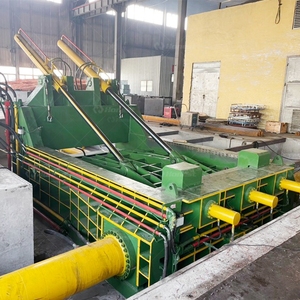


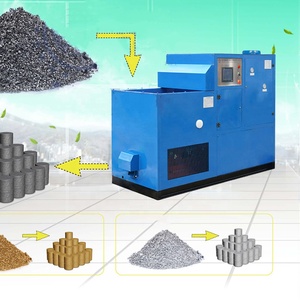




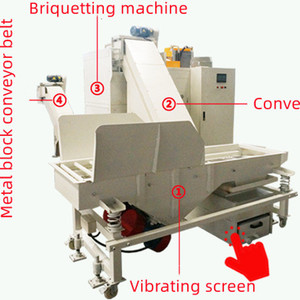


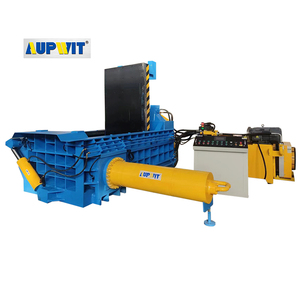
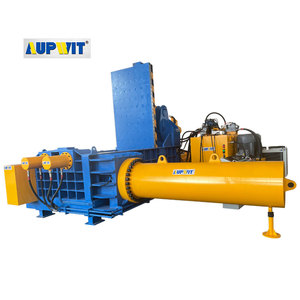










Scrap metal compressing machines are valuable tools in the recycling and waste management industry that play a crucial role in reducing metal volumes. Numerous types of scrap metal compressing machines are available, each designed to serve a specific purpose.
Baling press:
This machine is mainly used to reduce the size of metals into bales. A baling press works by applying force vertically or horizontally to a metal scrap piece. This force will result in the compaction of the scrap piece to form a bale. Compacted bales are easier to handle, transport, and store. They are also profitable for recycling companies.
Shear:
A metal shear compressing machine cuts large metal scrap pieces into smaller ones. It utilizes blades and tremendous hydraulic force to slice through thick metal pieces. This machine is often employed to process car bodies, metal pipes, and heavy gages and facilitates the efficient shredding of metal parts by minimizing their size.
Granulator:
A metal granulator is used to break down small metal scrap pieces. It employs rotating blades to cut and grind the metal into smaller particles or granules. This machine is essential in processing electronic waste, cables, and wires.
Shredder:
Metal shredders are machines that reduce entire metal objects into small pieces. After metal shredding, the scrap pieces can be easily compressed, thus optimizing the recycling process. Metal shredders work by utilizing a combination of rotary and stationary blades to tear apart the metal objects.
Chip wringer:
Chip wringers are machines that extract excess coolant and lubricant from metal chips. These chips are produced during the machining and manufacturing processes. Chip wringers utilize high-speed centrifugal forces to separate liquids from solids. They play a vital role in minimizing waste and ensuring that recoverable fluids are stored correctly.
Power:
The power of a scrap metal compressing machine is crucial in determining its efficiency and capability. Typically measured in kilowatts (kW) or horsepower (HP), the machine's power rating indicates the motor's strength driving the compression process. Higher power ratings allow for exerting more considerable force to compress scrap metal, particularly dense or large-volume materials. Selecting a machine with an appropriate power rating ensures it can handle the intended scrap metal types and volumes effectively.
Hydraulic Pressure:
Hydraulic pressure, measured in pounds per square inch (PSI), indicates the force exerted by the hydraulic system of the scrap metal compressing machine. This determines the machine's ability to compress scrap metal, impacting its size and density after compression. Higher hydraulic pressure ratings offer increased compression force, allowing the machine to handle more challenging scrap metal materials. Choosing a machine with suitable hydraulic pressure ensures efficient compression and productivity in dealing with various scrap metal types.
Compaction Ratio:
The compaction ratio of a scrap metal compressing machine is the ratio between the volume of the scrap metal being compressed and the volume of the compressed bale or bundle. This indicates the efficiency of the machine in reducing the volume of scrap metal, thereby facilitating easier storage and transportation. Different machines may have varying compaction ratios, which depend on their design and compression methods. A higher compaction ratio signifies better volume reduction and productivity.
Machine Size
The size of a scrap metal compressing machine is typically specified in terms of its dimensions when assembled, including length, width, and height. These specifications are crucial in determining the footprint the machine occupies in a recycling facility or workspace. The machine's size must be appropriate for the available floor area, ensuring sufficient space for operation, material feeding, and post-compression handling of the scrap metal. Additionally, the machine's weight, which is often expressed in tons, is also important. The heavy-duty construction required to withstand the forces generated during the compression process results in significant machine weight. This helps ensure stability during operation and durability.
Regular lubrication:
Regular lubrication is a vital phase in the maintenance of a scrap metal compressing machine. This ensures smooth operation and the prevention of premature wear and tear on moving parts. Key components like bearings, guide rails, hydraulic cylinders, and chains need to be lubricated carefully. Operators should also choose the right lubricating oil or grease and be mindful of the applicable environmental conditions and equipment service life to attain effective lubrication.
Cleaning:
Cleaning is a crucial maintenance task for a scrap metal compressing machine. Regularly removing metal shavings and dust buildup helps keep the machine in optimum condition. Focus on cleaning areas like the cooling fan and radiator to ensure proper heat dissipation and prevent overheating. The compressed metal blocks should also be removed promptly to avoid excessive loads on the equipment, which can lead to damage. Maintaining a clean machine fosters stable operation and a longer service life.
Regular inspections:
Regular inspections are an essential maintenance task for a scrap metal compressing machine. By checking various parts of the machine periodically, potential issues can be discovered and dealt with in a timely manner. Inspection of key components like hydraulic cylinders, seals, bearings, chains, and more can help found problems such as wear, leakage, vibrations, or abnormal noise. This allows for prompt repair or replacement, thereby preventing small faults from developing into major breakdowns and ensuring reliable operation over the long term.
Compressors are useful in recycling plants. In such facilities, broken cars, appliances, and batteries constitute some of the scrap metal received. The scrap metal is sorted, cleaned, and fed into the compressor. The compressor will produce compact bales for easy storage and shipping.
Transfer stations also benefit from scrap metal compressors. Waste management companies may use the machine to reduce scrap metal volumes before transferring them to recycling plants. The compacted scrap metals will take up less space in the vehicles. Thus, the efficiency of the metal compressor will be improved.
Scrap metal compressors are helpful at salvage yards and auto wrecking yards. After extracting valuable parts from old vehicles, the remaining metal takes up unnecessary space. By compressing the leftover metal using a machine, salvage yards can reduce its volume significantly. The bales produced can be sold or stored until they are recycled.
Industrial facilities that produce a lot of scrap metal, such as foundries or machining companies, can use a mobile scrap metal compressor on-site. The compressor will help reduce the volume of scrap metal produced, saving storage space until it is disposed of or recycled.
There are several factors that customers should consider before purchasing a scrap metal compressing machine.
Metal type compatibility
Various scrap metal balers are suited for compressing specific kinds of metals. For instance, an electric motor scrap baler is designed to handle the unique characteristics of electric motors. Similarly, aircraft containers balers are tailored to address the distinct features and shapes of aircraft containers. Because of this unique design, it becomes efficient and easy to compress the specific metal. Therefore, buyers should purchase a machine that is compatible with the type of metal they intend to handle.
Bale size and weight
Different scrap metal compressing machines produce varying bale sizes and weights. In general, a good bale size and weight will depend on the buyers' business needs and handling capabilities.
Operating costs
The operating costs include energy consumption and maintenance requirements. Compressing machines with high energy consumption can lead to increased operating costs.
Automation and ease of use
Some people prefer automation features such as PLC control, while others prefer manual operation. Consider the automation and ease of use that the machine provides.
Safety features
Usually, handling scrap metal can be dangerous. When choosing a metal compressing machine, buyers should consider metal scrap safety features. The safety features may include emergency stop buttons and safety interlocks.
Service and support
When buying industrial equipment like scrap metal compressing machines, it is important to consider the kind of service and support the seller provides. Consider the warranty, technical support, and availability of spare parts.
Q1: What types of scrap metals can be processed using a scrap metal compressing machine?
A1: A metal baler can handle various scrap metal types, including iron, steel, aluminum, copper, brass, stainless steel, and alloy.
Q2: What are the benefits of using a scrap metal compressing machine?
A2: The machine reduces the volume of scrap metal, saving storage space and lowering transportation costs. It also makes recycling process more efficient and provides economic benefits to businesses.
Q3: Are scrap metal compressing machines environmentally friendly?
A3: Yes. Scrap metal compressors contribute to environmental sustainability by facilitating the recycling of metals, thereby diminishing the demand for fresh material extraction and reducing landfill congestion.
Q4: Can someone operate the metal compressing machine manually?
A4: Some machines have manual functions, but most are designed to be used with power/automation for safety.
Q5: Is training required to operate a scrap metal compressing machine?
A5: Yes. Operators may require training to ensure safety and proper handling of the equipment to optimize its functions.